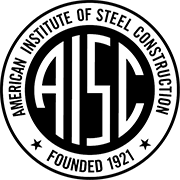Continuing Education
Development of a Computational Model to Estimate the Rollover Resistance of Open Web Steel Joist Seats
Joist seats play a critical role in the performance of open web steel joist systems because they transfer loads from the floor or roof deck to the end supporting girders or walls. The strength of these seats might be controlled by local sides-way instability or ""rollover"" when they are subjected to the combination of gravity and lateral loads. The current objective of this research is to develop and utilize a nonlinear finite element model to predict the stiffness and strength of typical steel joist seat configurations subjected to forces that produce local sides-way instability. The configurations studied include lapped and three-plate welded joist seats. Numerical results are validated against experimental data documented in the literature. Findings indicate that threedimensional nonlinear finite element models are capable of estimating the response of laterally loaded steel joist seats, and also demonstrate that the strength and stiffness of joist seats strongly depend on the seat configuration. In addition, these models show how the load is transmitted to the supports through the seats, and indicate the development of plastic zones as the seats deform. Future work includes preparing a parametric study to investigate the impact of design variables, including dimensions, configuration type and material properties, on the rollover resistance of open web joist seats with welded and bolted connections. Currently, the design of some joist seats can be completed by means of elastic or plastic mechanism approaches. Therefore, this study aims to generate more comprehensive design recommendations and guidelines to determine the rollover capacity of such seats.
- Date: 4/10/2018 - 4/13/2018
- PDH Credits: 0
SPEAKER(S)
Jean C. Batista Abreu and Ronald D. Ziemian; Bucknell University; Lewisburg, PA
